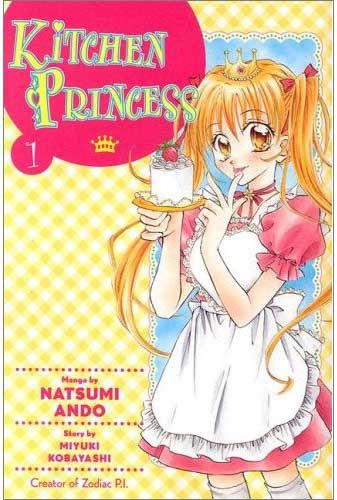Last summer I checked out the first two (of ten) volumes of Kitchen Princess out from my not-so-local library and was surprised and pleased that I liked the series a lot more than I expected but didn't have time to read the rest before I had to go back to school. So naturally one of the first things I checked out from it this sumer was the other eight volumes, it just ended up down a little lower in my stack so I'd have enough time to read all of them at my leisure.
Kitchen Princess written by Miyuki Kobayashi illustrated by Natsumi Ando
Summary: Najika is an orphan from Hokkadio who has recently come to Tokyo to attend school and finds herself in the elite class since she is not only a fantastic cook but can accurate taste every ingredient in a dish and remember it later on. She does also have a second reason to come to the school however, years ago when she was saved from drowning by a young boy who cheered her up and gave her a flan with the school's spoon stuck in it and she's always wanted to find him again and thank him for not only saving her life but for helping her find meaning and a reason to keep on living.
The Good: While romance does play a large role in this series I was pleased to see that it wasn't the driving force of Najika's life, she remains passionate about her cooking throughout and her search for her flan prince remains something that comes up only now and then (although I almost want to give the series credit for creating at least a more interesting than usual love-polygon, even if it was clear from the beginning who Najika would ultimately end up with). The series never gets dark although it does veer a little closer to darkness and tragedy than many shojo do and while sometimes the way it handles that gives the story a little more depth and heart at other times it flounders and becomes simply melodramatic instead.
The Bad: This series likes it's melodrama and overuses it by the end of the series. The best example comes at the series final climax where Najika is at a baking competition when tragedy (from an event outside the competition) strikes and that overwhelms the story. In this particular case the tragedy had been foreshadowed, I could had sworn it had already been taken care of by that point, but it still was just too much for the story, the competition would have worked just fine and this was hardly the only time the series did this. I wish the story had instead had less drama and just had the characters struggle through it to create tension, I think this would have also made the series feel slightly more mature since instead it feels like the creators are so worried that they're audience won't stay engaged unless there is something happening all the time that it's also a tad insulting.
The Art: KP reminds me of Fruits Basket in a few ways including in the art style (which is a bit odd since KP ran in the mid-aughts while it's tall oval shojo eyes look is more of a trait from the mid to late 90s, ie when Fruits Basket started). It's not my favorite type of art style (I prefer slightly less exaggerated character proportions and less screentone, heck it popped up as a translation note in nearly every volume since Ando was always mentioning it in the illustration notes) but the characters looked distinct from each other and everything flowed well so it technically more than fine.
So while the series didn't turn out to be quite as strong as I had hoped based on those first two volumes I still enjoyed it and will probably get Kodansha Comic's re-release omnibus editions at some point. Overall I'm giving this series a 3.5 out of 5 for being sweet, having it's heart in the right place, yet just missing the beat multiple times with it's fondness for melodrama.
